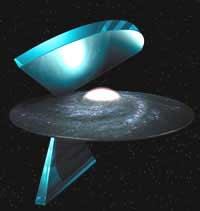
Using a powerful instrument on a telescope in Hawaii, UK astronomers have found ashes from a generation of stars that died over 10 billion years ago. This is the first time that the tell-tale cosmic dust has been detected at such an early stage in the evolution of the universe.
Dr. Kate Isaak of Cambridge University will be announcing these exciting new results at the National Astronomy Meeting in Bristol on 11th April 2002.
Using the SCUBA (Submillimetre Common-User Bolometer Arra

Sustainability may not be all it’s cracked up to be. That is the message in a recent paper by a hydrogeologist at Reading University . Michael Price argues that most human advances have been non-sustainable in the long term and that when we talk of ‘sustainable use’ we must define the period over which the use is planned or implemented.
Price identifies three major challenges currently facing Britain and the world. The first is that the climate, and with it the supply of water, is becoming

Astronomers use galaxies to reckon a subatomic particle’s mass.
By mapping hundreds of thousands of galaxies, astronomers have estimated the mass of the neutrino. They have also calculated the contribution that this mysterious subatomic particle makes to the total mass of the Universe.
The neutrino weighs no more than one-billionth of the mass of a hydrogen atom, Ofer Lahav of the University of Cambridge told the annual UK National Astronomy Meeting in Bristol today. Yet

Astronomers may have discovered a strange new form of matter.
Astronomers think they might have spotted a quark star, a mass of fundamental particles only a few kilometres across but weighing more than our Sun. If the star’s nature is confirmed, it would be the first example of this state of matter.
Theoreticians hypothesized the existence of quark stars in the 1980s. Today, NASA announced the discovery of such a star, based on results from their space telescope the Chandra

Diseases involving irremediable tissue damage of the musculoskeletal system account today for about 15% of hospital admissions in developed countries. With the ageing of the population, this is believed to gain significantly in importance in the coming years.
The majority of the disorders affecting the musculoskeletal system are the joint diseases, in particular osteoarthritis. The latter disease process is typically initiated and associated with defects of the articular cartilage and the un

Scientists at the University of Plymouth have been developing methods to `close the loop` on waste and pollution, by finding waste products that can be used to improve soil / plant-growth conditions. At the Society for Experimental Biology conference in Swansea Dr Stuart Lane presented ways in which garden and industrial waste could be recycled to benefit the environment.
In collaboration with Ecological Sciences Limited, Dr Lane`s group investigated a horticultural growth substitute for pea

– new calculation confirms standard model of particle physics. Contribution of hadronic vacuum polarization determined with unprecedented accuracy. The magnetic moment of the muon is an important precision parameter for…
Technique may prevent formation of unwanted waves that siphon off needed energy. Heating plasma to the ultra-high temperatures needed for fusion reactions requires more than turning the dial on a…

An international team of astronomers, led by researchers from the Astronomical Observatory of the University of Warsaw, have identified a new class of cosmic X-ray sources. The findings have been…

How deubiquitinases USP53 and USP54 cleave long polyubiquitin chains and how the former is linked to liver disease in children. Deubiquitinases (DUBs) are enzymes used by cells to trim protein…

Conceptual blueprint to analyze experimental catalyst data. Machine learning (ML) models have recently become popular in the field of heterogeneous catalyst design. The inherent complexity of the interactions between catalyst…

Antibody that Neutralizes Inhibitory Factors Involved in Nerve Regeneration Leads to Enhanced Motor Function after Acute Spinal Cord Injury. Researchers at 13 clinics in Germany, Switzerland, the Czech Republic and…

How simulations help manufacturing of modern displays. Modern materials must be recyclable and sustainable. Consumer electronics is no exception, with organic light-emitting diodes (OLEDs) taking over modern televisions and portable…

“Neurons that fire together, wire together” describes the neural plasticity seen in human brains, but neurons grown in a dish don’t seem to follow these rules. Neurons that are cultured…

The quest for sustainable energy solutions has been a major focus of scientific research for decades. Solar energy, a clean and renewable source, has emerged as a promising alternative to…

With a processing speed a billion times faster than nature, chip-based laser neuron could help advance AI tasks such as pattern recognition and sequence prediction. Researchers have developed a laser-based…

New technology could remotely identify various types of plastics, offering a valuable tool for future monitoring and analysis of oceanic plastic pollution. Researchers have developed a new hyperspectral Raman imaging…

Artificial Intelligence (AI) has established a strong presence across industries, large and small. The “VoBaKI” research project has empowered small and medium-sized enterprises (SMEs) with an innovative tool to independently…